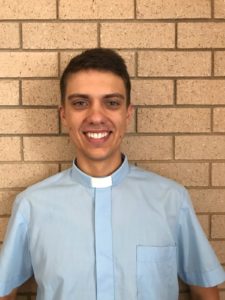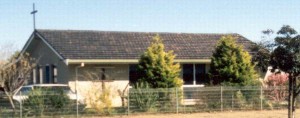Trinity Sunday
John (8:56-59) 10:22-42
For the second time within the space of three months Jesus is in Jerusalem for a festival and he is again found at the temple teaching. The first occasion is recorded in John 8. It was October and Jesus was in the city for the Feast of Booths and was teaching in the Temple treasury. In the context of a discussion about Abraham he made one of his strongest statements yet about his divinity. When questioned as to how he could know anything about Abraham, for Jesus spoke of him as if he knew him personally, he responded by saying; ‘Before Abraham was, I am.’ ‘I am’ was the name that God revealed to Moses when he asked his name. Jesus knew Abraham because before Abraham ever lived, Jesus was the one true and living God, the ‘I am’. And this is certainly how the Jewish authorities and the crowds interpreted him because they picked up stones to stone him (a brutal form of execution practiced at that time, but Jesus slipped away.
Now it is December, early winter, and Jesus is back in Jerusalem for another festival, the Festival of the Dedication of the Temple, known today as Hanukkah. This time he is teaching in a different part of the Temple complex, in the portico or colonnade of Solomon. In effect, it was a massive covered walkway that ran along the entire eastern side of the Temple and could hold at least 30,000 people. So it was a great place for big gatherings, or big speeches. In today’s text, which takes place in Solomon’s colonnade, we find a very close parallel to what happened during Jesus’ October visit to Jerusalem. Again, he there for a festival, again he is teaching in the Temple, again he is asked about his identity, again he makes a very strong statement about his divinity, again the crowds and authorities take up stones to kill him, and again he somehow slips away.
As we have seen, John likes to revisit themes to make a point. In this second similar story we have the same sequence of events but a more detailed account of what takes place.
A representative of the crowd, likely one of the religious leaders, interrupts Jesus to ask: ‘How long will you keep us in suspense? Just tell us plainly whether you are the Messiah or not.’
Of course, the reader of John’s Gospel will be scratching their head at this request, because Jesus has been telling them plainly who he is from the beginning. And John presents this more clearly than the other Gospels. There is no secret to Jesus’ identity in John’s Gospel.
So we a little amused when Jesus gives the obvious response. ‘I have been telling you, and you do not believe.’ Then Jesus goes on to explain that not only has he told them that he is the promised Messiah, but that he has showed them. He has shown them who is his by his deeds. He has done the things that it was long prophesied the Messiah would do. And while many had begun to believe in him, few among the religious leaders and authorities had – at least not openly.
So Jesus loses patience. He tells them that they have not understood because they are not his sheep. He has just finished telling the story of the shepherd and the sheep, and how the sheep hear the shepherd’s voice and follow the shepherd. So they would have immediately understood what Jesus was saying to them: that they, the leaders of the people, not only didn’t understand, but never would. Because they did not belong to the Messiah’s flock.
This comment would have made no friends about the religious authorities amongst the crowd gathered around Jesus. But things were about to get worse.
They did not understand that Jesus was the Messiah, even though Jesus had been telling them and showing them plainly. Now Jesus repeats that he is more than simply the Messiah. He is God come to them in human flesh. The last time he had said this to them plainly, during his visit two months earlier, they had tried to kill him. So at this point, everyone knows where this conversation is going. But Jesus goes there nonetheless. No one would be able to say later that he never told them exactly who he was.
‘I and the Father are one,’ he says to them bluntly. It is as clear and bold a statement as what he had said during his exchange with them in October at the Festival of Booths: ‘Before Abraham was, I am.’
Jesus did not leave any doubt as to his true and full identity. The Messiah was never meant to be just a great prophet, or another great king. The gulf between God and humans had become too great to healed by a great prophet or king. Something more was needed, much more. God himself needed to come among his people. And that was the big surprise about identity of the long-awaited Messiah. If the religious leaders had read carefully the texts about the Messiah they would have noticed the time that God said that he himself would come to his people, that he himself would be their shepherd and their king. (For instance, Exekiel 34)
So here is Jesus telling the religious leaders, once more, just who he is. And they respond the same way as they did the last time. And it is important that John records this. In both cases some might say that Jesus never meant to claim to be God. But the reaction of crowds and the authorities show that this is exactly what Jesus meant, and that they understood him very well.
In this account from today’s Gospel text Jesus engages the crowd before he slips away. He stops them, stones in hand, and asks if they can tell him for which of his good deeds, which of his healings, they are going to put him to death. This slows them for a moment, but not long. Soon someone retorts that they are not going to put him to death for any of his miracles, but for claiming to be God.
There is a clear dig here at the religious leaders, for in the previous chapter they were very upset that Jesus had healed a blind man on the wrong day, on the Sabbath. They were even angry at the man who had been born blind. And they wanted to arrest Jesus and put him on trial for his crime. So the truth was that they were, in fact, upset that he was healing people. But they were not about to admit as much in front of a crowd of witnesses. So they jump to the bigger, more serious charge of blasphemy, of claiming to be God.
But Jesus continues to engage them, quoting Psalm 82:6 that would have been well-known and regularly sung in Temple and synagogue worship. It says that God says to his people, ‘I have called you gods, children of the most high, all of you.’ So if God can call people gods, how can the one who is sent by the Father, and in fact is one and the same as the Father, be accused of blasphemy. Then Jesus reiterates the point he made about his relationship with the Father, explaining further that, ‘the Father is in me and I am in the Father.’
This gave his listeners quite a bit to think about it. And as they were discussing a response, and trying to organise themselves to arrest Jesus, he once again slipped away. And he left the city and went to the countryside, on the other side of the Jordan, officially outside of Israel, to the rural area where John the Baptist had preached. And there many ordinary people believed in him. So John ends this story with a contrast between the religious leaders and experts gathered in the temple in the capital city, who should be the first to recognise the Messiah when he comes, and the simple people of the country-side who first heard about Jesus from John the Baptist. This contrast not only puts the religious leaders to shame, but it demonstrate that it is neither impossible nor even hard to grasp the truth of who Jesus is and to accept it – that is, for those who had ears to hear, for those who were a part of his flock.
Now, in looking at this account and similar ones, you might be wondering why the religious leaders of Jesus’ day were so reluctant to accept that he was the promised Messiah? It seemed that there was nothing he could so or say that would convince them. Were they not, after all, the ones who made their whole lives and careers out of leading the people as they waited for the Messiah to come?
Well, that was perhaps a big part of the problem. Fyodor Dostoeysky, in a story within a story in his last novel, The Brothers Karamazov, imagines Jesus coming to earth again. But this time to Spain during the period of the Inquisition. Of course, Jesus is arrested and tortured by the Inquisition on behalf of the church that is supposedly waiting for Jesus’ return. Finally the Grand Inquisitor himself comes to meet Jesus. And what he says is a surprise.
‘It is You! … You!’ … Receiving no reply, the Inquisitor rapidly continues: ‘No, do not give an answer; be silent! … And what could you say? … I know but too well your answer…. Besides, you have no right to add one syllable to that which was already uttered by you before…. Why should you now return, to impede us in our work? For you have surely come for that purpose alone. But be aware of what awaits you in the morning? I do not know how or in what from you have returned; but tomorrow I will condemn and burn you on the stake, as the most wicked of all the heretics …’
The Grand Inquisitor in Dostoeysky’s story knows exactly who Jesus is. And that is why Jesus needs to be stopped. His coming again would ruin everything. It would put him and his team and the whole church out of business. So the problem of the Grand Inquisitor isn’t that he doesn’t recognize who Jesus is, but he cannot afford to accept who he is.
I think something similar was a play on the part of the religious leaders of Jesus’ day. They made much about sharing their peoples’ hope for the coming of the Messiah. But deep down they knew that if the Messiah did actually come, they would be out of business.
Another question that arises from this text has to do with the identity of Jesus. Just who is Jesus, anyway? He is clearly the Messiah, the promised one. But he is also more than that. Remember how John began his Gospel with the big spoiler? ‘In the beginning was the Word, and the Word was with God, and the Word was God … and the Word came and made his home among us.’ Perhaps we had nearly forgotten this extraordinary claim at the beginning of John’s Gospel, as we became engrossed in the story of Jesus that unfolded. But now, it comes up again. The mystery of the Messiah isn’t just that he is the shepherd and king who comes to rescue the lost of all nations, but he is God in human flesh. God has been walking and serving among his own creation in the person of Jesus. And now Jesus has told the Jewish leaders bluntly, for yet a second time in as many months, who he is.
For the Christian community that was gathered and empowered by the Holy Spirit after the resurrection and ascension of Jesus, this required a bit of thought. They had worshiped God as Father, but now Jesus tells them clearly that he himself is the ‘I AM’ who existed before Abraham was born, that he and the Father are one., that they dwell within one another. And then the Spirit of God is sent by the Father and Son (as we saw Jesus explain in last week’s text) on the day of Pentecost.
This led the church to confess that there is indeed only one true God, but that this God has manifested himself to us in three persons who are distinct yet remains one God as Father, Son and Holy Spirit. This ‘tri-unity’ of Father, Son and Spirit came to be known simply as the Trinity (which is short for tri-unity). It is in large part because of the statement of Jesus in today’s Gospel reading, and what we saw of the coming of God’s Spirit when we celebrated Pentecost Sunday last week, that the church came to celebrate on the very next Sunday, the Trinity – the fact that our very complex God comes to us as Father, Son and Holy Spirit – yet remains one God. A tri-unity of persons.
So Jesus reveals himself plainly as both the Messiah and God in flesh. But the religious leaders cannot understand or accept who he is. But Jesus’ sheep, who he calls and gathers by the power of the Holy Spirit from all the world, hear his voice. We recognise who Jesus is and follow him: Jesus the Messiah, God himself come to us in human flesh to make us one with him.
Amen.
Pastor Mark Worthing.
Port Macquarie.







